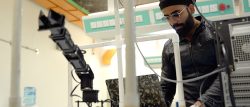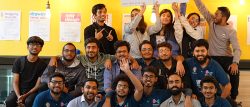Before the degree is conferred upon me and with the graduation just around the corner, I come bearing some essentials for university life; things I wish I knew in my first semester but learned along the way, sometimes by the support of my peers, instructors, and colleagues and sometimes the hard way.
To all my folks
- Avail a free subscription to premium versions of a multitude of online software and Apps
You can get a free subscription to premium versions of a multitude of online software and apps simply by claiming the education pack from Github. This includes, but is not limited to, (design people, hear up) access to Canva’s Pro tier! All you need is your official university ID to get the student benefits. You can find the link to the student developer pack below:
https://education.github.com/pack
You can also find free versions of many other creative softwares. Just try asking around from your peers or the IT Department. Do not spend sums of money on softwares that you can easily find online or from a colleague.
- Save your work, create backups, use storage devices and tools
There is nothing more excruciating and terrible than having your laptop give up on you just before your assignment deadline or right at the time when you are working on an unsaved project. Technical difficulties and device issues are inevitable. Do not wait up until they fall upon your head to do something about it. Save your work every now and then if working offline. Start using online workspaces such as that Google Workspace or Microsoft Office 365. Use storage devices and tools that are available online for free like Google Drive, OneDrive, Zotero etc. Just remember you have been provided with 1 terabyte of storage. Make use of it.
Quick Tip: Remove the burden from your laptop or device and transfer some of it to the one drive. The most foolproof option is to rely on cloud storage.
- Do not wait till your degree audit arrives to see what requirements you have fulfilled and what are left.
Make an excel sheet for yourself from day 1 and list down all the requirements for your own record. The 4-year grid will help you out in this. Double-check your audit with your list and visit your advisor before enrollment to check for any discrepancies.
- Take advantage of the Liberal Core and free electives.
Choose interdisciplinary courses. They broaden the way you think and allow you a wider spectrum and grasp over things. You will undoubtedly come across a lot of things that will intellectually challenge you and push you out of your comfort zone. Take time to understand them. Sit through them. You do not necessarily have to embrace them but try to co-exist with them.
- It is okay to not pursue a course if it is not working out for you.
You are allowed to drop it and no one can stop you. You can take it another semester. Do not overburden yourself just for the sake of pushing yourself. The next iteration of the course might work out for you even better.
- Take a break.
Listen to your body. All-nighters are not cool. If anything, they only push you to the point of burnout. Proper sleep and modest eating is what will get you through the day without putting strain on your mind while also not hindering your performance. You don’t have to study all the time. Rest is equally important too.
Engage and interact with students from batches above and below you.
Try to work with them whenever you get a chance (be it in academic or non-academic settings) or participate in conversations about their experiences and journey. This accelerates your learning and not only gives you a horizontal perspective on the trajectory of university life but also a vertical dimension.
As part of the student body, you will always hold a certain power over the university’s functions and policies. Make wise use of that power and employ it for the betterment of the community and voice your concerns for those who need it. This includes not just the administrative staff, the faculty members, and the student body but also, and importantly, the TCT staff.
- When working in groups, set up collective norms that apply for each member.
This can include the frequency of your meetings, the timings for your meetings, division of work, and establishing roles. Take meeting minutes so everyone in the group remains informed about the progress and if need be, the instructor can also have a look at them. Communicate. Communicate. Communicate. DON’T GHOST.
For my SDP Folks
- Try to fulfil your SDP field practicum before the beginning of your senior year.
Best to do it in the summers or winters preceding your senior year so you can channel your focus towards the planning of your thesis, capstone, job search, or applications for grad schools. It will also allow you an insight into what kind of work environment is your true calling.
- Learn as many creative softwares as you can.
Get your hands on those quant softwares. It works in the long run and allows you creative control over your work without depending on someone else or outsourcing.
- Write.
Even if that means scribbling your daily routine or making notes. But write. It helps in courses which are writing intensive.
- Don’t stress about jobs.
Job hunting remains to be an overwhelming, tedious, and a daunting process especially when your degree spans such a wide spectrum. Trust that Habib has prepared you well enough and equipped you with the skillset that is required of any professional environment. Remember not to compromise on remuneration packages that do not commensurate with your experience or profile. You will get there.
Never hesitate to extend support or ask for some. The previous batches have shown untiring efforts to diligently make this space loving, kind, empathetic, and accepting. The baton has been passed to you now.




